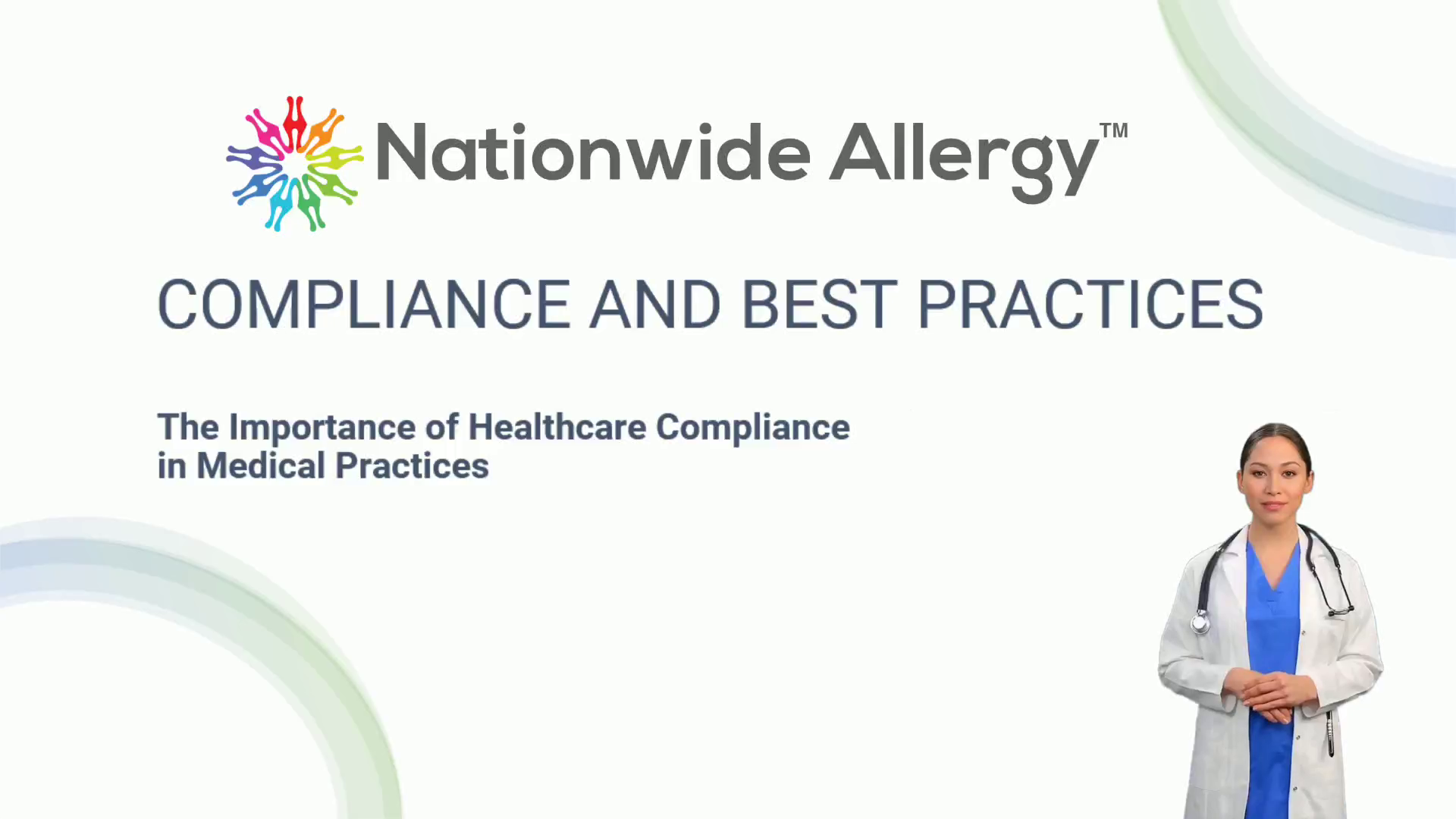
COMPLIANCE AND BEST PRACTICES
Scene 1 (0s)
[Virtual Presenter] Thank you for taking the time to watch the Nationwide Allergy presentation on Compliance and Best Practices. Today, we will delve into the crucial topic of healthcare compliance in medical practices, specifically focusing on the significance of billing accuracy and fraud prevention. It is important to understand the importance of these aspects in maintaining the integrity of a medical care provider’s practice and delivering high-quality care to their patients..
Scene 2 (32s)
[Virtual Presenter] In this presentation, we will explore why billing accuracy holds utmost importance, particularly when dealing with Medicare, Medicaid, and other health insurances. These insurance programs are essential for ensuring access to healthcare for millions of individuals. Healthcare providers have a responsibility to honor their guidelines and requirements. Their commitment to accurate billing practices directly impacts the financial stability and integrity of their medical practices..
Scene 3 (1m 7s)
[Virtual Presenter] Let's begin by understanding why billing accuracy matters. Medicare, Medicaid, and other health insurances play a pivotal role in our healthcare system, ensuring that vulnerable populations have access to necessary medical services. By accurately documenting and billing for the services provided, practitioners support the sustainability of these programs. Moreover, accurate billing practices allow medical providers to allocate resources effectively and maintain the trust of insurance providers and beneficiaries. Accurate billing also helps prevent financial losses within a practices. Errors or inaccuracies in billing can result in delayed or denied payments, causing cash flow issues and impacting the overall financial health of our organizations. By adhering to billing guidelines, practitioners safeguard the financial stability and long-term success of their medical practices.
Scene 4 (2m 7s)
[Virtual Presenter] Non-compliance with healthcare regulations can have severe repercussions. Federal agencies such as the Centers for Medicare and Medicaid Services (CMS) and the Office of Inspector General (OIG) have extensive measures in place to detect fraud and waste in healthcare billing. They employ advanced data analytics and conduct routine audits to identify irregularities and improper billing practices. Those found guilty of non-compliance may face significant consequences. This includes substantial fines, which can have a detrimental effect on the financial viability of providers’ practices. Moreover, individuals or organizations found to have engaged in fraudulent activities may be excluded from participating in federal healthcare programs. This exclusion can severely limit our ability to serve patients and potentially lead to the closure of our practices. In the most severe cases, criminal charges may be filed..
Scene 5 (3m 12s)
[Virtual Presenter] Beyond the legal aspects, there is a moral imperative at play. Healthcare providers have an obligation to their patients to provide quality care with integrity. Accurate billing practices demonstrate their commitment to delivering the highest standard of care while ensuring transparency and fairness in resource allocation. Practitioners’ patients trust them with their well-being, and they rely on their expertise and ethical conduct. By accurately billing for the services they provide, they contribute to the trust and confidence their patients have in a provider’s practice. Ensuring equitable allocation of healthcare resources through proper billing practices is not just a legal obligation but a fundamental aspect of providing compassionate and patient-centered care..
Scene 6 (4m 0s)
[Virtual Presenter] To establish robust compliance systems, practitioners need comprehensive training programs for their staff. It is essential to invest in ongoing education and training to ensure that their team members are well-versed in the ever-evolving landscape of healthcare regulations and billing guidelines. By providing regular training sessions, workshops, and resources, practitioners empower their staff to navigate the complexities of compliance confidently. In addition to training, regular audits and internal reviews are vital components of maintaining compliance. These reviews allow providers the opportunity to assess their billing processes, identify potential errors or discrepancies, and take proactive steps to rectify them. By conducting audits, providers can detect any irregularities, such as coding errors, upcoding, or unbundling, and address them promptly. This systematic approach helps to ensure that a provider's billing practices align with the requirements set forth by Medicare, Medicaid, and other health insurances. Ultimately, it is a provider’s responsibility to make sure their billing methods are accurate, compliant, and adhere to any and all legal requirements. Leveraging technology and electronic health records (EHRs) can significantly streamline our billing processes and reduce the likelihood of errors. EHRs offer advanced features that automate documentation, flag potential billing errors, and facilitate accurate coding. With integrated billing modules, one can ensure that claims are generated accurately, reducing the chances of errors in coding or claim submission. Implementing technology-driven solutions not only enhances billing accuracy but also improves efficiency and reduces administrative burden within provider’s medical practices. By investing in comprehensive training programs, conducting regular audits, and utilizing technology like EHRs, providers can establish a robust compliance framework within their medical practices..
Scene 7 (6m 17s)
[Virtual Presenter] In conclusion, healthcare compliance and billing accuracy are paramount in medical practices. Upholding the highest standards of integrity in providers’ billing processes is not only a legal obligation but also essential for the financial stability of their practices and the trust they build with their patients. By adhering to the guidelines and requirements of Medicare, Medicaid, and other health insurances, providers demonstrate their commitment to ethical conduct and responsible resource allocation. Accurate billing practices safeguard the sustainability of these programs, ensuring that they can continue to provide essential healthcare services to those in need. Furthermore, maintaining compliance protects the financial stability of their practices. By accurately documenting and billing for the services they provide, they reduce the risk of delayed or denied payments, which can impact cash flow and hinder their ability to deliver high-quality care. Additionally, compliance goes beyond the legal aspects. It reflects a provider’s dedication to their patients' well-being. Accurate billing practices contribute to equitable resource allocation, ensuring that all patients receive the care they need in a fair and transparent manner..